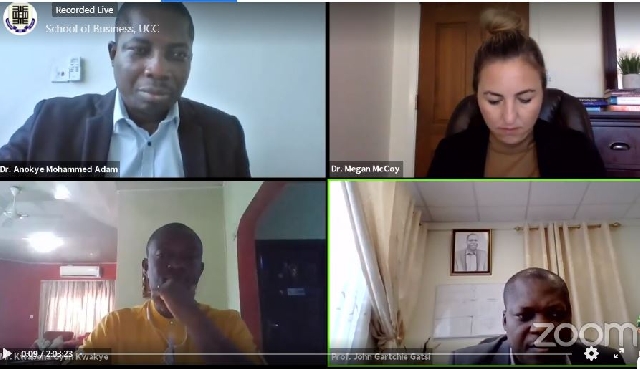UCC Business School holds e-seminar on COVID-19, household financial anxiety
 The seminar was done via zoom
The seminar was done via zoom
The University of Cape Coast School of Business in the College of Humanities and Legal Studies has organised an e-seminar on the topic: ‘Coronavirus Pandemic, Household Financial Anxiety and Well-being’, which featured Dr Megan McCoy, a professor of practice in the area of financial therapy from Kansas State University; Mr Kwabena Gyan, an economist with the World Bank, Accra; and Dr Anokye Mohammed Adam, the Head, Department of Finance in the School of Business, UCC.
Prof, John Gatsi, the Dean of the School of Business, in his introductory comment, explained that it was apt to focus on personal finance which also involves family finance, retirement finance, and household savings because many discussions about the effects of Coronavirus pandemic are focused on macro-level issues such as fiscal policy, monetary policy, general job losses and disruption in the global supply chain without paying attention to broader financial issues affecting Households.
He said those effects resulted in anxiety, psychological problems and health challenges. He further explained that household anxiety is a function of the uncertainty of maintaining one’s job, income stream and support from external sources such as government social protection schemes.
Prof Gatsi indicated that issues of financial therapy and financial literacy are critical at a time when the pandemic has deepened vulnerability and inequality in many economies including Ghana. He stated that less attention to personal financial education has led to little or no savings and investments by households to fall on during the pandemic.
Prof Gatsi said in the absence of elaborate formal savings, the development of financial products to improve access to credits could help.
He lamented that formal savings by households in Ghana, as presented by the Statistical Service since 2014, was 35% and the situation has not changed significantly.
He advised the government to look at data as an asset and invest in general data for development because post-economic management demands data-driven policies. He advocated for conservative investments and conservative expenditures by households.
Prof Gatsi said the good lesson about the pandemic is that Ghanaians are naturally creative and innovative inclusive empowerment is required to promote enhanced Ghanaian participation in the economy.
He said if, in the midst of the pandemic, we are able to set aside GHS600 million, it means we have what it takes to revisit strategies to support creativity.
Dr McCoy explored the importance of financial therapy for households in times of difficulty to reduce stress and other psychological challenges. When people are not sure of maintaining their jobs due to the pandemic, they show instability and fear always. she advised that financial therapy during the Coronavirus pandemic should not be overlooked. She advocated for personal finance principles should be part of training for children and adults alike.
Dr McCoy Pledge her support to help the department of finance develop solution-oriented financial therapy programs to benefit students and the catchment areas of the University of Cape Coast. She said personal finance and financial therapy should be as practical as possible to serve as a clinic for households to seek advice, guidance and plans toward expenditure containment measures.
For his part, Dr Adam discussed the importance of planning and spending on only important things because one cannot tell when the pandemic will be over. He promised to propose personal finance as part of the basket of courses to engage students. He advised the government to allow small businesses to register free as an incentive.
Dr. advised that households should pursue savings as a religious duty to protect the future needs just as they pay tithes and offering in Church. He further advised that households should be open to financial planning principles because their many people irrespective of their level of education are financially ill and need a financial clinic.
He advised the government to use its support schemes to further generate data from households and micro and small businesses arguing that technology alone is not enough to formalise the informal sector.
Dr Adam appealed to all to take financial anxiety and wellbeing issues serious because the effects of the pandemic at the macro level will definitely translate to household levels.
Mr Gyan explained that the World Bank has supported the government of Ghana with $100million as credit facility to fight Coronavirus pandemic geared toward households and small businesses.
He said the bank has worked at policy levels with the government in the financial sector interventions. He explained that the bank cannot control the government in the way it manages the Coronavirus Alleviation Programme and hope that the disbursement of the funds will not discriminate against qualified businesses. He further stated that the World bank only controls fully direct interventions which are not in the hands of the government.
Mr Gyan assured the public that the bank has experience in reducing household poverty and will continue to support Ghana. He asked for improved data collection to better develop programs that will solve household problems.
Source: classfmonline.com
Trending News

Cold cases not abandoned- Attorney General to Ghanaians
13:45
E/R: Police investigate 5 suspects for impersonating NAIMOS officials, extorting miners
18:53
Ghana launches one-day expedited passport service
15:25
GTEC directs UG to reverse fee hikes by Jan. 12
11:54
NDC Regional Chairman extends annual support to vulnerable groups in Assin Foso
02:59
Goldbod to put rest alleged claim of losses on Monday, Jan.5
15:08
Gov’t condemns alleged assault on Class Media Group journalist
11:53
Margins Group reaffirms commitment to innovation and service delivery as 2026 begins
02:35
Ashanti Regional Minister announces rehabilitation of 200 drug addicts after Tinker Island clean-up
14:58
Stalled road projects reactivated as Ghana nears completion of debt restructuring – Roads Minister
11:07




